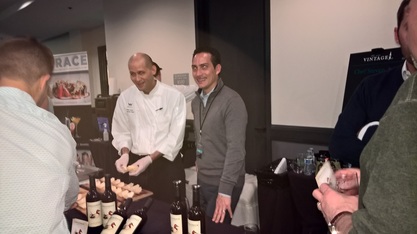Some Takeaways and Learnings

Cheeses:
As cheese makers, of course we spent a significant amount of time talking to vendors about their cheeses. What was interesting is the difficulty purveyors were having in procuring milk that met their high quality standards.
The taste and texture of any cheese is largely dependent on the quality of the milk which is used in the cheese making process. Just like fine wines, the quality of the final product is dependent on the soil and mineral content of the region. In places, where the cows, sheep and goats graze in outdoor pastures, they are taking in the vital nutrients of their natural environment. The resulting cheese that is made from this sweet, wholesome milk is natural, healthy and flavorful.
Have you ever heard of Vitamin K2? It is an important nutrient which helps us to absorb Calcium and deposit that needed Calcium in the correct place in our bodies. Without Vitamin K2, Calcium can be deposited as plaque in a variety of places, not all of them being beneficial to our health. Fortunately, pasture grazed animals produce milk which is a rich source of Vitamin K2. In addition to that, the process of making and aging cheese with the Gouda culture also produces Vitamin K2.
For the best quality, nutrition and taste, look for cheeses that are made from the milk of "grass-fed" or "pasture-grazed" animals.

Another quickly growing area has been hard ciders. While various hard ciders have been produced in the U.S. since the repeal of prohibition, the Northwest has recently become the epicenter of a craft cider revolution. Since 2012, cider’s popularity has grown more than 60 percent each year, with the strongest growth happening in Washington State and Oregon.
Key attributes to seek are cideries that ferment their hard apple ciders from local, whole-pressed apples—rather than the apple juice concentrate used by many brands—and limits the time from branch to bottle. The same is true of other ciders produced from other fruits such as pear.
Be aware that most commercial cidermakers are required to pasteurize their cider, and the process they use will affect the flavor. Preferably, sweet cider should be “cold pasteurized,” which kills microorganisms with ultraviolet light. The usual method of pasteurization kills microorganisms with heat, which affects the flavor of the juice. If you’re not sure which method a local cider mill uses, it doesn’t hurt to ask.
Whenever possible, seek cold pasturized ciders versus typical pasturization methods which affects the flavor.

Farmed, foraged and crafted are now frequently heard words. A local focus mean offerings filled with contemporary, inventive dishes using regional specialties, including farm fresh produce and locally foraged ingredients. Some of the most fabulous dishes included soy braised pork served on eco-friendly bamboo boats offered up from TRACE's Executive Chef Steven Ariel. Chef Ariel works closely with local purveyors to offer up the best the season has to offer, ranging from sustainable seafood to organic fruits and vegetables.
Locally harvested ingredients are simpler to achieve by staying seasonal and preserving foods as needed.

Sustainable and organic not only touches local products, but is important when sourcing foods from farther away. Although it is desirable to buy local whenever possible, limitations related to availability and quality may require one to look further abroad. When doing so, remember to select those products raised and harvested using the most sustainable and ethical practices possible while upholding Fair Trade practices. A few purveyors turned our heads with the purity of their products. Two of these included chocolate purveyors that minimize sugars and other flavors to focus on the chocolate itself. The artisan process, honed with attention to craftsmanship, results in the richest, most flavorful chocolates you’ve ever tasted.
Wine and chocolate have a long-standing reputation for excellent pairing opportunties. Careful craftsmanship results in an array of truly distinctive chocolates with balance and complexity—not unlike those found in exceptional wines.

 RSS Feed
RSS Feed
